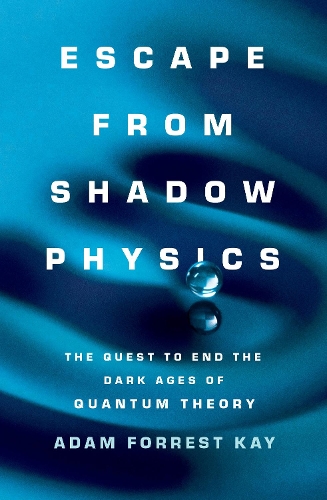
Escape from Shadow Physics: the quest to end the dark ages of quantum theory
(Paperback)
Publishing Details
Escape from Shadow Physics: the quest to end the dark ages of quantum theory
By (Author) Adam Forrest Kay
Scribe Publications
Scribe Publications
2nd July 2024
Australia
Classifications
General
Non Fiction
Quantum physics (quantum mechanics and quantum field theory)
Physical Properties
Paperback
496
Width 154mm, Height 230mm, Spine 39mm
606g
Description
An engaging and razor-sharp attack on the orthodoxy of modern physics, and a bold new idea about the structure of reality. For 70 years, mathematical physicist Adam Kay argues, physics has laboured under delusions. 'When it comes to atoms,' the founding quantum physicist Neils Bohr once wrote, 'language can only be used as in poetry.' Since the earliest days of quantum mechanics, its founders have firmly stressed that what goes on inside an atom is impossible to rationally describe. Kay fundamentally disagrees. Escape from Shadow Physics is his fiery rebuke to Bohr's mentality and his theory, arguing that quantum physics is as logical, reasonable, and intuitive as any other scientific theory - or at least it will be, if scientists will let it. Kay aims to free us from the shackles of Bohr's obscure theorising - which Bertrand Russell referred to as 'the shadow physics of our time' - and to restore the basic principles of scientific inquiry to quantum mechanics. Thanks to Kay's cutting-edge work at MIT, a genuine understanding of quantum mechanics may be just around the corner. Building on his research and from the original ideas of pioneers such as Einstein and de Broglie, Kay calls for a new understanding of quantum physics- the Ensemble Interpretation. Through bouncing droplets of oil, his team has observed quantum mechanical behaviour emerging on a macroscopic scale - a stunning breakthrough, indicating that quantum and classical physics are not as irreconcilable as we have been led to think.
Author Bio
Adam Forrest Kay studied classics and physics at the University of Colorado, and did his graduate work in England and France. He is the recipient of many scholarships and academic distinctions. He has two PhDs, one in literature from the University of Cambridge and the other in mathematics from the University of Oxford. His maths dissertation discussed the possibility of three-dimensional hydrodynamic quantum analogues. Adam's current research interests centre around realist models of quantum mechanics, relativity theory, and partial differential equations, particularly variable coefficient wave equations.
